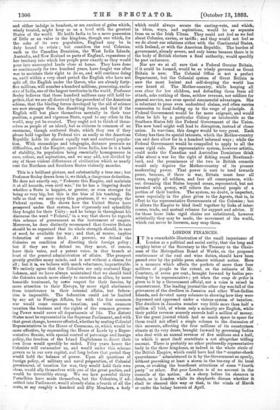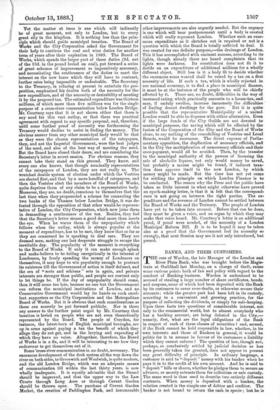LONDON FINANCES.
IT is a remarkable illustration of the small importance of London as a political and social entity, that the long and weighty letter of the Secretary to the Treasury to the Chair- man of the Metropolitan Board of Works, on the proposed continuance of the coal and wine duties, should have been passed over by the public press almost without notice. Here is a measure which affects the pockets of more than four millions of people to the extent, on the estimate of Mr. Courtney, of seven per cent., brought forward by bodies pro- fessing to be representative ; yet when the coup de grdce is given to it by a Government official, not a voice is raised in remonstrance. The leading journalthe other day was full of the grievances of the dwellers in Jamaica and other West-Indian Islands, and devoted many columns to showing how they were depressed and oppressed under a vicious system of taxation. The dwellers in Jamaica number very little more than half a million all told, of whom only a minority are English, while their public revenue scarcely exceeds half a million of money. Yet the great journal which had so mucsh space to spare for them could not afford a single column to the discussion of this measure, affecting the four millions of its countrymen situate at its very doors, brought forward by governing bodies who deal with an annual revenue of five millions and a half, to which it must itself contribute a not altogether trifling amount. There is probably no other professedly representative body in the three kingdoms, or indeed in the whole circle of the British Empire, which could have had the "counter-check quarrelsome" administered to it by the Government soopenly, without provoking at least a storm in the tea-cup of its local press, or evoking the beneficent attentions of some "fourth party" or other. But poor London is of no account in the councils of the nation. As a sheep before its shearers is dumb, so is London while its shepherds discuss whether it shall be sheared this way or that, in the winds of March or under the balmy breezes of April. Yet the matter at issue is one which will indirectly be of great moment, not only to London, but to every great city in the kingdom. It is nothing less than the prin- ciple which should guide municipal taxation. The Board of Works and the City Corporation asked the Government for their help to continue the coal and wine duties for another term of years after their expiration in 1889. The Board of Works, which spends the larger part of these duties (9d. out of the 13d. in the pound levied on coal), put forward a series of great schemes of improvement as imperatively necessary, and necessitating the continuance of the duties to meet the interest on the new loans which they will have to contract, further rates being impossible or undesirable. The Secretary to the Treasury, in refusing at present to entertain the pro- position, emphasised his doubts both of the necessity for the new expenditure, and of the necessity or desirability of meeting it by the proposed tax. The estimated expenditure was thirteen millions, of which more than five millions was for the single purpose of a cross-river communication below London Bridge. Mr. Courtney says that it is not shown either that there is any need for this vast outlay, or that there was practical agreement with regard to any specific proposal, and, therefore, until some farther proof of necessity was forthcoming the Treasury would decline to assist in finding the money. The obvious answer from any other municipal body would be that as they were the chosen representatives of the ratepayers, they, and not the Imperial Government, were the best judges of the need, and also of the best way of meeting the need. But the Board have closed their doors, and are considering the Secretary's letter in secret session. For obvious reasons, they cannot take their stand on this ground. They know, and every one else knows, that though nominally representatives of the ratepayers of London, they are not really so. The wretched double system of election under which the Vestries are elected first, and that by a mere handful of ratepayers, and then the Vestries elect the members of the Board of Works, quite deprives them of any claim to be a representative body. Moreover, they are, no doubt, conscious to themselves that the last time when they propounded a scheme for connecting the two banks of the Thames below London Bridge, it was de- feated through the opposition of that other would-be represen- tative of London, the City Corporation, which now joins them in demanding a continuance of the tax. Besides, they feel that the Secretary's letter means a good deal more than meets the eye. When he warns them of the unpopularity which follows when the outlay, which is always popular at the moment of expenditure, has to be met, they know that so far as they are concerned he is speaking to deaf ears. They are doomed men, making one last desperate struggle to escape the inevitable day. The popularity of the moment is everything to the Board of Works. If only it can make enough splash and make-believe to be toiling energetically in the interest of Londoners, by freely spending the money of Londoners on themselves, it may hope to win popularity enough to protract its existence till the Government of action is itself defunct, and the era of "sects and schisms" sets in again, and private interests are stronger than public, and people are content only to let things be. If the day of unpopularity should come, then it will come too late, because no one but the Government can reform the municipal institutions of London, and no Conservative Government would lay its hands on such excel- lent supporters as the City Corporation and the Metropolitan Board of Works. But it is obvious that such considerations as these can scarcely be put forward publicly. Nor is there any answer to the further point urged by Mr. Courtney that taxation is levied on people who are not even theoretically represented by the Board. The people of Croydon, for instance, the latest-born of English municipal boroughs, are up in arms against paying a tax the benefit of which they allege they do not get, and in the levying and expending of which they have no voice. Altogether, therefore, the Board of Works is in a fix, and it will be interesting to sec how they endeavour to get themselves out of it.
Some 'cross-river communication is, no doubt, necessary. The enormous development of the dock system all the way down the river on both sides, to Greenwich and Woolwich, is quite modern, and the old London Bridge, which was an adequate means of communication till within the last thirty years, is now wholly inadequate. It is equally advisable that the Strand should be improved, and that the upper way to the Law Courts through Long Acre or through Covent Garden should be thrown open. The purchase of Covent Garden Market, the creation of Paddington Park, and innumerable
other improvements are also urgently needed. But the urgency is one which will bear postponement until a body is created which will really represent London. Whether such an enor- mous expenditure as it sketches out is required or not is a question with which the Board is totally unfitted to deal. It was created for one definite purpose,—the drainage of London. This it has accomplished with eminent success, according to its lights, though already there are heard complaints that its lights were darkness. Its constitution does not fit it to decide on an expenditure of additional millions for a wholly different object. Still less is it a body fit to decide whether the enormous sums wanted shall be raised by a tax on a first necessity of life. If such a tax, which is wholly rejected in our national economy, is to find a place in municipal finanoe, it must be at the instance of the people who will be chiefly affected by it. There are, no doubt, difficulties in the way of increased rating, which practically amounts to a house-tax, and may, if unduly swollen, increase immensely the difficulties of finding decent dwellings for the poor. But it is quite possible that the representative Municipality of a united London would be able to dispense with either alternative. Even if the large funds of the City Guilds are not devoted to municipal purposes, the saving which will be effected by the fusion of the Corporation of the City and the Board of Works alone, to say nothing of the remodelling of Vestries and Local Boards, would be enormous. The direct expense of Parlia- mentary opposition, the duplication of necessary officials, and in the City the multiplication of unnecessary officials and their over-payment, would all be avoided. Then, by the transfer to the municipal authority of the powers of licensing the sale of alcoholic liquors, not only would money be saved, but probably a means might be found, if indirect taxa- tion does approve itself to the new London, by which money might be made. But the time has not yet come for settling the principle on which London Finance is to be conducted. The reason why the Press and the public have taken so little interest in what might otherwise have proved an epoch-making letter, is that it ia felt that the correspond- ence is not going on between the right parties. The ex- penditure and the revenue of Loudon cannot be settled between the Board of Works and the Treasury. The people of London have yet to be taken into counsel. Before that can be done, they must be given a voice, and an organ by which they may make that voice heard. Mr. Courtney's letter is an additional proof, if proof were needed, of the necessity of a London Municipal Reform Bill. At is to be hoped it may be taken also as a proof that the Government feel its necessity so strongly, that next Session may see it not only introduced, but passed.



































 Previous page
Previous page